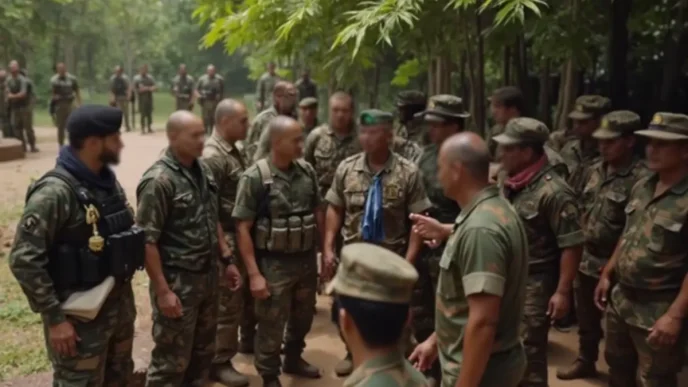In a case that has captured public attention in the Philippines, hip-hop artist Omar Baliw, whose real name is Omar Harry B. Manzano, has filed a copyright infringement complaint against Pastor Apollo C. Quiboloy, a prominent religious leader and senatorial candidate, and Dr. Marlon Rosete, president of SMNI and convenor of Quiboloy’s campaign movement. The complaint, lodged on March 24, 2025, at the Pasig Regional Trial Court, centers on the unauthorized use of Baliw’s popular song “K&B” as a campaign jingle for Quiboloy’s political bid. This legal battle raises significant questions about intellectual property rights and the intersection of politics and culture in the Philippines.
Allegations of Unauthorized Use
The core of Baliw’s complaint is the alleged misuse of his 2019 hit song “K&B,” which has amassed millions of views on platforms like YouTube, including nearly 69 million for a viral performance on Wish 107.5. According to the affidavit submitted to the court by Baliw and his legal counsel, Atty. Jeanne Castillo Anarna, the song was adapted—without permission—for Quiboloy’s senatorial campaign. The modified version, featuring altered lyrics and melody to align with campaign slogans, was first used during a kick-off event on February 11, 2025, in Pasig City. The complaint states that the track was publicly reproduced and performed without authorization during a campaign broadcast.
Further, Baliw claims the altered version of “K&B” was played at multiple “recorida” events—live public announcements—across the Philippines following the initial campaign launch. A video featuring parts of the jingle remains posted on the YouTube channel of a Quiboloy supporter, Darwin Salceda, despite Baliw’s prior efforts to halt its use. Before filing the criminal complaint, the rapper sent a cease-and-desist letter to Quiboloy and Rosete, demanding they stop using the song. According to the affidavit, their refusal to comply escalated the issue into what Baliw’s legal team describes as a clear violation of intellectual property law.
Under Republic Act 8923, the Intellectual Property Code of the Philippines, copyright infringement carries severe penalties. For a first offense, violators face imprisonment of one to three years and fines ranging from 50,000 Philippine Pesos (US$850) to 150,000 Philippine Pesos (US$2,550). Penalties increase for subsequent offenses, with fines reaching up to 1.5 million Philippine Pesos (US$25,500) and imprisonment of up to nine years. Baliw’s legal team argues that the unauthorized reproduction and public performance of “K&B,” coupled with the defendants’ disregard for the cease-and-desist demand, constitute a criminal offense under these provisions.
A Fight for Artists’ Rights
Speaking to reporters after filing the complaint, Baliw emphasized the broader significance of his legal action. “Bilang artist sobrang halaga ng copyright para samin. Ito yung art namin. Ito yung ginagawa namin. Di lang para sakin para rin sa mga kapwa artists ko” he said, highlighting that copyright protection is vital not just for him but for all Filipino artists. His words underscore a growing concern among creative professionals in the Philippines about the protection of their intellectual property, especially in an era where digital platforms make unauthorized use and distribution easier than ever.
Atty. Anarna reinforced this sentiment, clarifying that the case is not primarily about financial damages but about safeguarding rights. “To be clear po this is not about doon sa damages. This is to protect the copyrights of our Filipino artists… We are ready to pursue this to the full extent of the law and all the remedies available to our client” she told the press. Her statement reflects a determination to set a precedent that could influence how intellectual property disputes are handled in the context of political campaigns, where creative works are often repurposed for promotional purposes without proper licensing.
Political and Cultural Implications
The case also draws attention to Pastor Apollo C. Quiboloy, a polarizing figure in the Philippines. As the leader of the Kingdom of Jesus Christ, a religious group with a significant following, Quiboloy has styled himself as the “Son of God,” a claim that has sparked both devotion and controversy. His decision to run for a senatorial seat in the upcoming elections has placed him under intense public scrutiny, with this copyright dispute adding another layer of complexity to his campaign. Quiboloy’s political aspirations are supported by a network of loyalists, including Dr. Marlon Rosete, who heads SMNI, a media outlet associated with the pastor’s movement.
The unauthorized use of “K&B” raises questions about the ethical boundaries of political campaigning in the Philippines, where music and media play a central role in engaging voters. Campaign jingles are a staple of Filipino elections, often adapted from popular songs to create memorable slogans. However, as this case illustrates, the line between creative inspiration and intellectual property theft can be thin. If Baliw’s allegations are upheld in court, it could prompt a wider discussion about the need for stricter guidelines on the use of copyrighted material in political contexts.
Moreover, the dispute highlights the cultural significance of hip-hop in the Philippines, a genre that has grown in popularity over the past decade as a medium for social commentary and personal expression. Artists like Omar Baliw have used their music to address issues ranging from poverty to political corruption, resonating with a young, urban audience. The alleged misuse of “K&B” by a religious and political figure like Quiboloy may be seen by some as an appropriation of a cultural artifact, further fueling debates about power dynamics between influential leaders and independent creators.
Legal and Social Context
Intellectual property law in the Philippines, as embodied in Republic Act 8923, aims to protect creators’ rights in a country where piracy and unauthorized use of content have historically been rampant. While the law provides a framework for addressing infringements, enforcement remains a challenge, particularly in high-profile cases involving powerful individuals. Baliw’s decision to pursue legal action against Quiboloy—a figure with considerable influence—demonstrates a willingness to confront systemic issues within the creative industry, even at personal or professional risk.
Public reaction to the case, as gauged through social media platforms and local news coverage, appears divided. Supporters of Baliw argue that his fight for copyright protection is a stand for all artists who struggle to maintain control over their work. On the other hand, some of Quiboloy’s followers have defended the pastor, suggesting that the use of the song was a form of tribute or that the issue has been exaggerated for political gain. These differing perspectives reflect the broader tensions between artistic freedom and political power in the Philippines, a nation with a vibrant yet often contentious democratic process.
Broader Impact on Intellectual Property Rights
Beyond the specifics of this case, the dispute between Omar Baliw and Apollo Quiboloy could have far-reaching implications for intellectual property rights in the Philippines. A favorable ruling for Baliw might encourage other artists to assert their rights against unauthorized use, potentially leading to greater awareness and respect for copyright laws. Conversely, if the court rules in favor of Quiboloy and Rosete—or if the case is dismissed on technical grounds—it could reinforce perceptions that powerful individuals are above legal accountability, further discouraging creators from seeking redress.
The case also comes at a time when the Philippine government is under pressure to strengthen its intellectual property framework to align with international standards. As a signatory to various global treaties on copyright protection, such as the Berne Convention, the Philippines is obligated to ensure that its laws and enforcement mechanisms adequately protect creators. High-profile cases like this one could serve as a litmus test for the country’s commitment to these obligations, particularly in the digital age, where content can be replicated and distributed with ease.
Looking Ahead
As the legal proceedings unfold at the Pasig Regional Trial Court, the case of Omar Baliw versus Apollo Quiboloy will likely remain a focal point of public discourse in the Philippines. It is not just a battle over a song but a broader struggle over the rights of artists, the ethics of political campaigning, and the balance of power in a society where influence often overshadows accountability. Whether this dispute will lead to meaningful change in how intellectual property is respected—or whether it will be overshadowed by the larger political ambitions at play—remains an open question.














